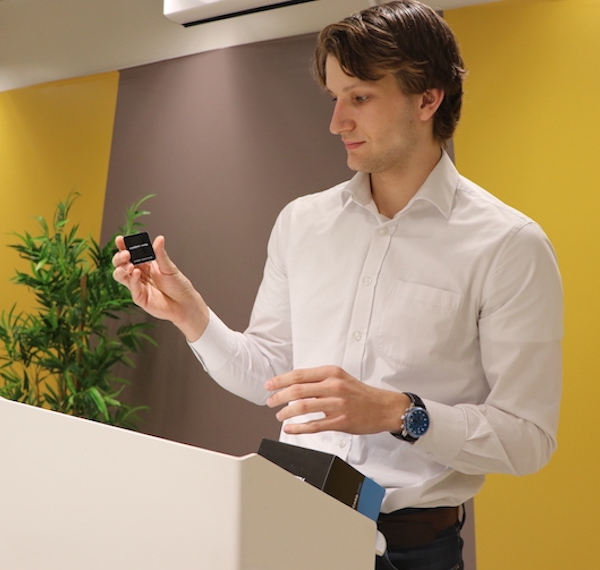

I came up with my business idea commuting to work, during the midst of the Covid pandemic. I was looking at my contact lens kit and wondered if the cleaning container that came with it could be adapted for today’s world where hand sanitiser is a must at every entrance.
I got in touch with the Milan-based company that produced the product and negotiated a deal to repurpose them, swapping the contact cleaning solution for an antiviral gel.
GelCard was born, a reinvention of the hand sanitiser experience to make it more premium and efficient. At doorways it eliminates the need for queues of people - who should be social distancing - waiting for their turn to pump. But, more fundamentally, it makes the sanitisation process an enjoyable one.
Each super thin, credit card-sized sachet snaps open to release an individual serving of hand gel, to be kept in bags, pockets or lying waiting for guests at establishments who seek a sleeker experience. The packaging can be branded bespoke, and our clients include The Wolseley and Park Plaza.
It was time to tell the world...
We were making sales. We’d reached about £155,000 after approximately four months of our main customer not being in lockdown, had signed up a few big name hospitality clients and wanted to reach more. As a startup we knew that what we were doing was unique and innovative, and we wanted everyone to know. So we decided to take a step into the world of PR.
It can be hard to understand the power of PR, as the general consensus of opinion seems to be divided. Some people are skeptical or have had a bad experience with PR in the past, while others have seen it transform people and companies to their full potential. Just look at the way PR has scaled companies like Airbnb and Warby Parker. I never doubted the reliability of public relations. In fact, I was always certain public relations worked to some degree, I just was not sure how much of a difference it could make.
Before I got started with my first PR project, I explored all kinds of routes in order to find the best person for the job. I spoke with my business contacts and reached out to my journalist friends asking for the best recommendations. I chatted with boutique agencies and London PR firms, and consulted with at least four different freelancers before I finally narrowed it down to Stephen.
Like many of the others I spoke with, Stephen was experienced and pleasant. However, there was one main reason why I chose to work with him above the rest: his demonstrable contacts with journalists. This was the one tangible variable that mattered to me over everything else. His access was something I was willing and excited to pay for.
Once I decided on Stephen, the next step was starting our working relationship. Onboarding a freelancer for the first time is something that is done best when both parties carve out the appropriate time to get on the same page. My experience with Stephen was not only streamlined, but straightforward. He started by pitching his ideas to me, and I asked questions and made adjustments that we agreed upon. I next filled out a large Q and A so that he could understand my exact needs, and the rest is history!

Someone once told me that the most expensive thing you can do is pay for something cheap that doesn’t deliver. I ended up increasing my budget slightly to work with the consultant I liked best, and it paid off. Buy cheap, buy twice!
The results were amazing...
My PR consultant worked with me to finesse my business story and ensured it landed with the right media at the right time, with the most relevance. This was really a collaboration, as he needed information from me to craft his best work.
Among the coverage generated, we had some outstanding hero pieces like the interview for Business Insider UK, as well as Japan, and TV interviews on Bloomberg and Sky News, which actually played our YouTube marketing videos - something I never expected but that really helped people understand our business and product
Key learnings
Ready to start your PR journey with a highly recommended freelancer? Sign up and post a new brief in minutes to start receiving matches and proposals from our UK PR freelancer network.